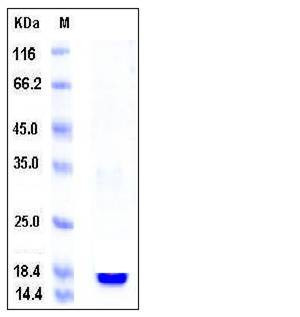Mouse Cyclophilin A / PPIA / CYPA Protein (His Tag)
2700098C05,Cphn,CyP-18,CypA
- 100ug (NPP3285) Please inquiry
| Catalog Number | P50296-M08E |
|---|---|
| Organism Species | Mouse |
| Host | E. coli |
| Synonyms | 2700098C05,Cphn,CyP-18,CypA |
| Molecular Weight | The recombinant human mouse PPIA consisting of 170 amino acids and has a calculated molecular mass of 18.8 kDa. It migrates as an approximately 17 kDa band in SDS-PAGE under reducing conditions. |
| predicted N | Met |
| SDS-PAGE |  |
| Purity | > 97 % as determined by SDS-PAGE |
| Protein Construction | A DNA sequence encoding the mouse PPIA (NP_032933.1) (Met 1-Leu 164) was expressed, with a polyhistide tag at the C-terminus. |
| Bio-activity | |
| Research Area | Microbiology |Pathogenic microorganism |viruses |animal virus |viral illness |Central nervous system diseases | |
| Formulation | Lyophilized from sterile PBS, pH 7.4, 10% glycerol 1. Normally 5 % - 8 % trehalose, mannitol and 0.01% Tween80 are added as protectants before lyophilization. Specific concentrations are included in the hardcopy of COA. |
| Background | Mouse peptidyl-prolyl cis-trans isomerase A, also known as PPIase A, Rotamase A, Cyclophilin A, Cyclosporin A-binding protein, PPIA and CYPA, is a cytoplasm protein which belongs to the cyclophilin-type PPIase family and PPIase A subfamily. Cyclophilins (CyPs) are a family of proteins found in organisms ranging from prokaryotes to humans. These molecules exhibit peptidyl-prolyl isomerase activity, suggesting that they influence the conformation of proteins in cells. PPIA / Cyclophilin A accelerate the folding of proteins. It catalyzes the cis-trans isomerization of proline imidic peptide bonds in oligopeptides. PPIA / Cyclophilin A is secreted by vascular smooth muscle cells in response to inflammatory stimuli, and could thus contribute to atherosclerosis. It is not essential for mammalian cell viability. PPIA / Cyclophilin A can interact with several HIV proteins, including p55 gag, Vpr, and capsid protein, and has been shown to be necessary for the formation of infectious HIV virions. |
| Reference |
